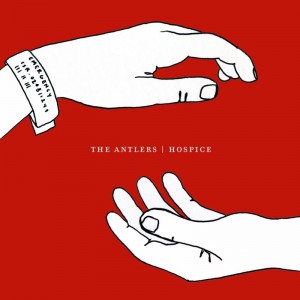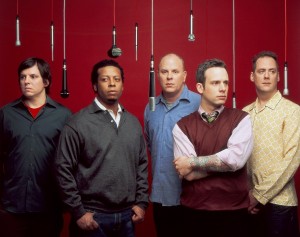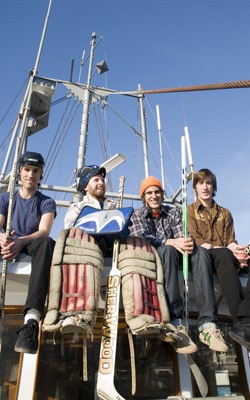The following originally appeared in Beatroute Magazine. I ducked out of a lecture to perform this interview. It was very rock and roll. I just need a leather jacket to be James Dean now, they tell me.
Darby Cicci is sitting in the middle of an electrical storm. One third of the experimental indie rock band the Antlers is struggling for cell reception and watching as the storm takes its toll on wayward paper products. “I literally saw, like, this blue napkin thing under the gas station thing… It just sort of exploded.” The setting is more than appropriate to talk about the success of their latest album, Hospice. The intensely layered and nuanced record has lead to extended tours, singles, videos and, apparently, some bad weather.
Few albums release to the critical reaction of Hospice. The Antlers’ third full-length album in around four years hit with such fanfare as to launch it toward a label release and numerous year-end best-of lists. The album tells the story of an abusive cancer patient in the Sloan Kettering Cancer Ward and a man that becomes entangled in the complexities of their shared grief. The record has a cinematic edge to it, and has received the music video treatment before, but the new video for Hospice’s loudest track, “Sylvia,” takes pages right out of the Hollywood playbook.
“I started brainstorming with the director a lot about ideas. I think the starting point…we wanted to have this duality. I wanted something volatile…almost violent without being too dark.” The video portrays a man in a run-down cabin sharing (and not exactly enjoying) a meal with ghost of his dearly departed. The imagery works well with the song, the sepia tones and flashback memories meshing tonally with an album preoccupied with remembrance and loss. “We talked about ideas about ghosts and images and holograms, in a way. We wanted this ghost figure to be kind of real and kind of not.” He continues, “It’s kind of about claustrophobia and dealing with a problem that might be imaginary.” Director Trey Hock made the decision to film the video in black and white, pulling influence from classic auteur D.W. Griffith.
The Antlers lined up a long tour with the momentum of Hospice, including summer festival appearances including Lollapalooza. The problems with playing the particularly wrought and emotional material to a festival crowd is not lost on Cicci.
“It makes it very stripped down. We can’t really do the theatrics on an outdoor stage. There’s usually a lot more people at an outdoor show. It’s a little more of a rock show, in a way. We try and open it up.” Cicci says the band shies away from the quiet and subtlety of the album when faced with a crowd swimming in beer.
Hospice was conceptualized by Antlers frontman Peter Silberman, but built upon as a collaborative effort, an Antlers first. Cicci admits that his attachment to the very personal material in Hospice is different than Peter’s or bandmate Michael Lerner’s, but is no less potent. “I have to experience it in my way and develop it. I have a lot of similar experiences that I can use to understand it. It’s very natural to me.”
Darby says that what worked on Hospice is not going to be the way into the future for the band. Instead, he insists that something distinct is on the horizon.
“It’s going to be dramatically different. It already is.” Recording has been ongoing on new material, and Darby is confident that while different, the Antlers will produce something just as worthwhile.
“It’s sounding a lot different, and we’re going to play some on this tour.” Cicci says, though he remains pragmatic, adding, “Unless they sound horrible. Then we won’t.”
Comments Off on Interview – Darby Cicci of The Antlers


